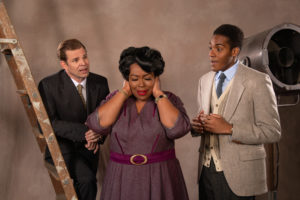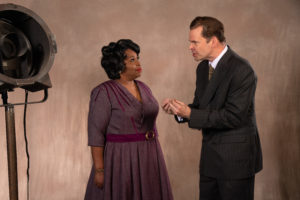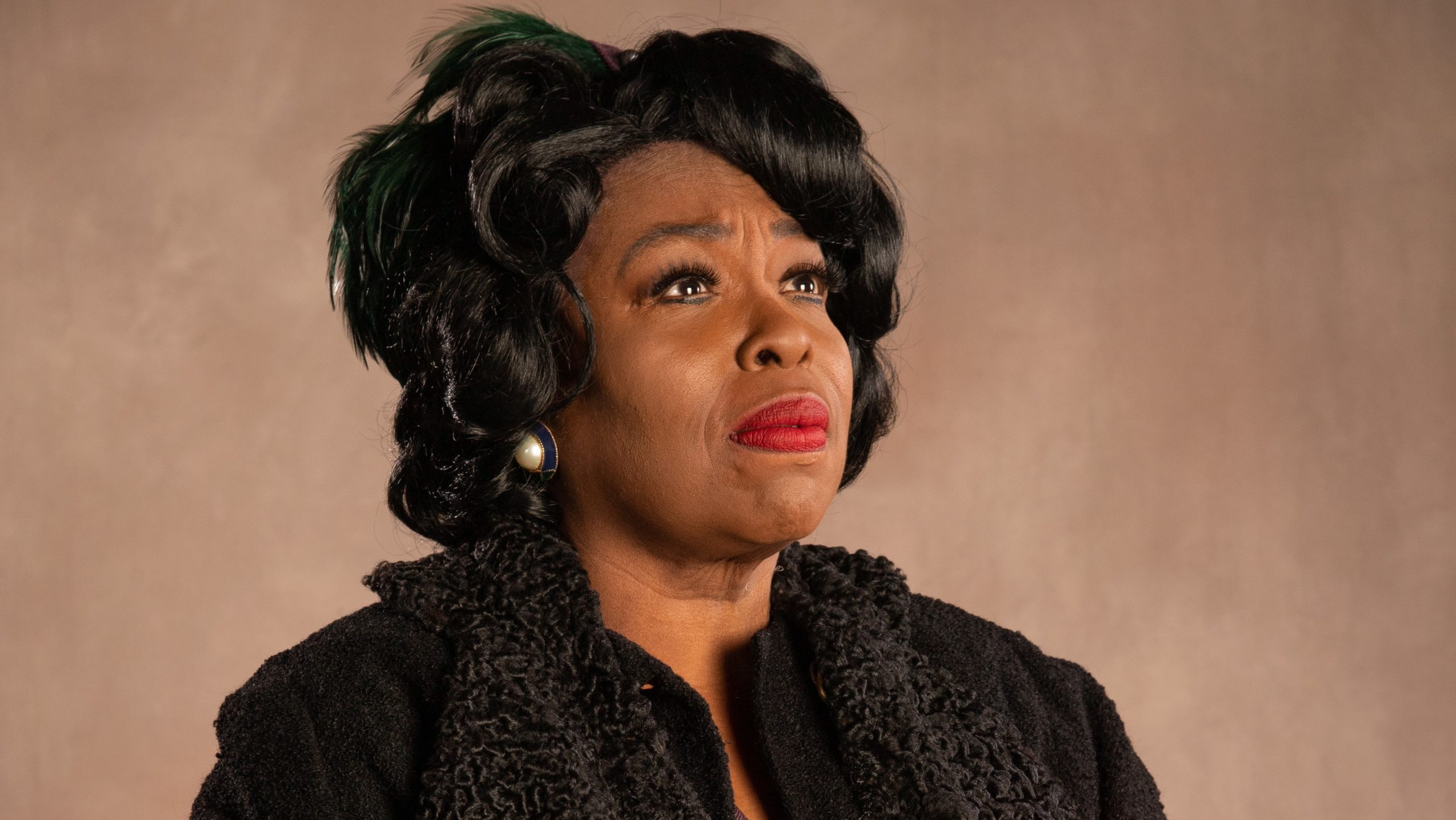CEDAR CITY — The acting and directing of Trouble in Mind at the Utah Shakespeare Festival are so riveting that I left the show wishing it were hours longer.

Taking place in the 1950s, Trouble in Mind tells the story of a group of actors, a stage manager, and their director working to mount a new play, Chaos in Belleville, about a lynching in a small town in the South. The white director, who is also a producer, is completely convinced that this is a Very Important Play and destined to be both a commercial and social success. However, the rehearsal process becomes rocky when Wiletta Mayer, a veteran African American actress, takes issue with the script, which was written by a white man. In the end, Wiletta stands her ground, and the group is forced to grapple with the day-to-day reality of living in an America where very different people need to learn to get along.

Trouble in Mind was an off-Broadway hit in 1955. And in an example of life imitating art, the play’s African American playwright, Alice Childress, was invited by a group of white producers to transfer the show to Broadway — under the condition that she rewrite the script to give the show a reassuring, happy ending. Like Wiletta, Childress refused to accommodate white tastemakers, and the play was denied a greater level of recognition. Trouble in Mind, though, is experiencing a Renaissance, with its Broadway premiere occurring in 2021 and regional theatre companies mounting productions around the country. With its unflinching portrayal of the hopes and disappointments of everyday Americans, Childress’s script is a masterpiece of mid-20th century realism on par with the great works of Arthur Miller or Tennessee Williams. It is gratifying to see Trouble in Mind getting its due.
Director Melissa Maxwell has crafted a production that does not hesitate to make its audience feel uncomfortable with its portrayal of racism and interpersonal conflict. Maxwell uses this discomfort to build empathy for the African American characters, and she regularly breaks the tension with moments of lighthearted humor or quiet kindness among the characters. Maxwell is adept at using the pregnant pause, and there are times when the actors marinate in the silence, allowing the audience to absorb the emotional gravity of the characters’ situation. Despite these pauses, the play flies by; the two-hour running time feels like half that duration.

Yvette Monique Clark is absolutely stunning as Wiletta. In the first scene, she gives practical advice about how to survive as an African American actor in a white man’s industry. It shows that Wiletta is a caring woman who wants to help others whenever she can. Wiletta’s transformation into a woman who stands up to that industry and fights for dignity in her profession is inspiring to see. Clark gives a rousing monologue in the final scene that represents the culmination of Wiletta’s trials, and the visceral power Clark invests into the speech results in a breathtaking and unforgettable performance. Yet, she also plays the small moments well. Clark showed Wiletta as a woman experienced in subtly protecting herself from the callousness of her white colleagues. For Clark, something as simple as taking a half step back from a white man, or turning her gaze away during an uncomfortable conversation had years of history behind it. Wiletta has used these defense mechanisms so much that they are almost automatic for her, and seeing that in Clark’s performance fosters endless pathos for Wiletta.
Antonio TJ Johnson plays elderly African American actor Sheldon Forrester, a man who has made a living portraying good-natured characters. Johnson’s performance is delightfully surprising, as the carefree attitude gets peeled away to reveal a man who has known more pain and fear because of the racist establishment than anyone else in the play. When Johnson gives a serious monologue about a traumatic event in Sheldon’s past, the performance is engrossing because the pain in his voice felt primevally real. The theater may have had hundreds of people in it, but Johnson’s performance made it as quiet and solemn as an empty church.

Maurice-Almé Green plays John Nevins, an African American man who embodies W. E. B. Du Bois’s Talented Tenth. College educated, young, and optimistic, John is ready to make his mark on the world as he embarks on an acting career. Green gives an earnest performance that is the play’s main source of hope. His character is comfortable and experienced in interacting with white people (especially Judy, an actress from a privileged background), and Green’s bright-eyed charm often served to ease the tension of a scene. Cherita Armstrong plays Millie Davis, a young African American actress who is tired of playing poor people, such as maids and sharecroppers. Armstrong’s wistfulness when Millie dreams of wearing a fancy costume endeared me to the character immediately.
Among the white characters, Judy Sears (played by Bailey Blaise) is the most interesting. For Judy, oppression is purely theoretical, and her initial statements of protest against the American system ring hollow. Blaise allowed the character’s initial naivety to drop away, and it was gratifying to see Judy learn how to listen to her co-workers’ firsthand experiences with racism. Rex Young plays the show’s antagonist, director and producer Al Manners. Young plays Al as a slimy showbiz dealmaker, and the slicked back hair and fake friendliness towards the actors (who are actually his employees) makes him untrustworthy from the beginning. The character’s overt sexism is overwrought by today’s standards, but in the 1950s such behavior was much more commonplace. Young refuses to play Al as a stock character villain, and Al’s frustration and surprise when he finds his social views questioned were palpable and realistic .

Indeed, none of the characters are stereotypes, and when played by this superb cast, they are all fully fleshed-out human beings. Moreover, there are layers to every performance: most of the actors are playing actors who play characters, and their change in demeanor and tone from rehearsing a scene to talking as themselves was completely believable. But there was an additional change that occurred when characters of the same race were alone and able to speak freely. The mask of politeness and diplomacy dropped, and a more relaxed and truthful atmosphere pervaded the show. Jo Winiarski‘s set design amplified this feeling; the false proscenium shrunk the stage and created the illusion of peering into the world of the play. For me as a white man, this was amplified as the African American characters would talk among themselves because I had the sense that I was watching conversations that were not meant for me.
Finally, I must commend Myrna Colley-Lee’s costume designs. Yes, they were great period designs, with well tailored suits for the men and skirts and heals for the women. But I was most taken by the elegant dress and jacket ensembles and jewelry for Millie. Seeing her dressed to the nines while performing a simple stereotypical role was incongruous. That single image encapsulated the indignities that Millie, Sheldon, and Wiletta had experienced in their careers.
At the end of the play, Wiletta says, “I always wanted to do something real grand in the theater.” With Trouble in Mind, this cast has. But Trouble in Mind is more than grand: it is a tour de force. This play’s audience members will find themselves enriched and entertained with direction and acting that are second to none in Utah.
[box]The Utah Shakespeare Festival production of Trouble in Mind plays various dates at 2 PM or 8 PM at the Randall L. Jones Theatre on the campus of Southern Utah University. Tickets are $44-84. For more information, visit bard.org.[/box]

